How the 7/7 bombings changed a generation of British Muslims
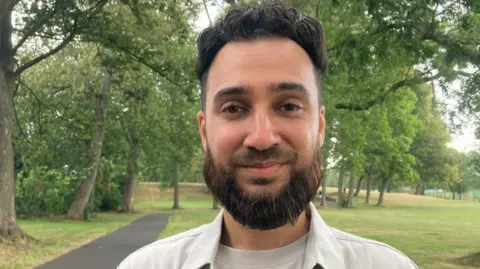 BBC/Sabbiyah Pervez
BBC/Sabbiyah PervezOn 7 July 2005, 52 people were killed and hundreds more injured in bombings targeting London's transport network during rush hour. The attacks sent shockwaves across the world - but particularly so in Leeds where three of the four suicide bombers grew up.
"It changed the stereotypical narrative of what a terrorist looked like to someone who was British-born, wearing western clothing and with a backpack," says youth worker Fahad Khan, who was 18 at the time of the atrocity 20 years ago.
"When I found out they were from Leeds, it was just a huge blow."
Mr Khan now volunteers at the youth centre which some of the bombers visited in their teenage years.
On 7 July 2005, three Tube trains and a bus were struck in quick succession, in what MI5 says was the "first successful attack by Islamist suicide bombers in the UK".
All four of the suicide bombers were under the age of 30 and three were British-born sons of Pakistani parents from the Beeston and Holbeck areas of Leeds.
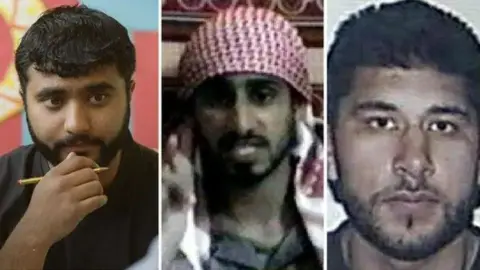
Local people were traumatised and the events forced issues like extremism and radicalisation to the forefront of the city's Muslim community.
For Mr Khan, now 38, the news altered people's perceptions of young Muslim men.
"It changed that narrative to someone who looked like me - and that's a lot to deal with," he says.
In the aftermath of the bombings, Mr Khan started volunteering at the Hamara Centre in Beeston.
Mohammad Sidique Khan, 30, said to be the leader of the group, was a youth outreach worker there, while staff previously confirmed that two of the other bombers, Shehzad Tanweer, 22, and Hasib Hussain,18, also spent time at the centre.
Following the bombings, Mr Khan's goal was to engage young people and help them find their voice.
"We were talking to young people from very deprived communities," he explains.
"Often first-generation British-born people like myself, with a disconnect from their parents, language barriers and no support in dealing with these huge issues and feeling targeted by policies the government was making at the time.
"Our aim was to bring these kids from the periphery into the centre."
After 7/7, the government launched a series of initiatives aimed at preventing future attacks. These included Prevent, set up in 2006.
It is one of four strands of the government's umbrella counter-terrorism strategy Contest and designed to support people at risk of joining extremist groups and carrying out attacks.
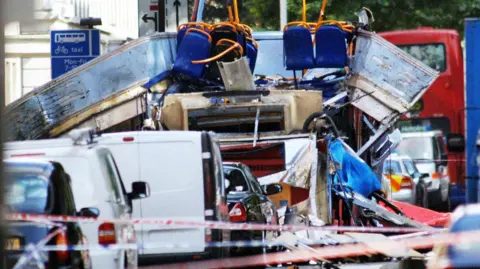 PA
PAAnti-radicalisation work is carried out in schools, faith organisations and prisons.
However, the Prevent strategy has been criticised by some MPs, the National Union of Teachers and the Muslim Council of Britain.
Some argue it is counterproductive and that it can make Muslim students feel isolated and can add to a general sense of distrust across communities.
Yahya Birt, a researcher, British Muslim affairs academic and community advocate, was among those consulted by the government in the early days after the attacks.
"My hope was that we could create policies with real buy-in from Muslim communities," he says.
"But we never achieved that consensus.
"The Muslim communities wanted a more pastoral approach where they dealt with youth issues seriously and get support for that...but the government wanted a combative approach to take on extremist elements.
He added: "That wasn't something the Muslim community were equipped to do."
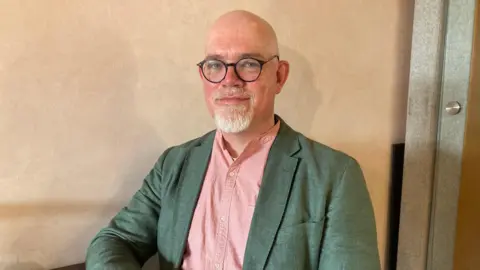 BBC/Sabbiyah Pervez
BBC/Sabbiyah PervezBaroness Sayeeda Warsi, who is also from a Pakistani Muslim family in West Yorkshire, was just beginning her political career at the time of the bombings.
In 2007 she became the first Muslim to serve as a minister in a shadow cabinet.
But Ms Warsi called the government's anti-terrorism plans "toxic".
"It was supposed to be an upstream policy done with Muslim communities, but it became a policy done to Muslim communities," she says.
"It wasn't about a battle of ideas - it became about policing communities."
A Home Office spokesperson said: "We now have one of the strongest counter-terrorism frameworks in the world which does not target any one community and deals with all forms of terrorist ideology."
They added the "appalling" 7/7 attacks had had a "lasting impact on victims, survivors, loved ones, and communities".
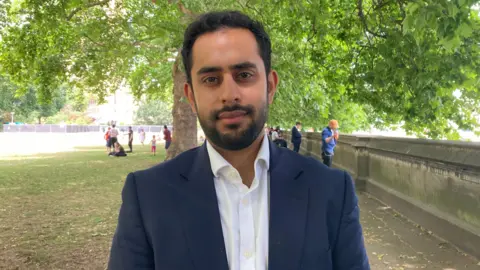 BBC/Sabbiyah Pervez
BBC/Sabbiyah PervezMuhbeen Hussain MBE was just 11 when the attacks happened.
The tragedy inspired him to join a peace walk organised by 7/7 survivor, Gill Hicks, that changed his life.
"There was a perception created about British Muslims, and I was growing up in that era," he says.
"I didn't believe these men represented my religion or identity - it made me want to step up and call it out."
Mr Hussain, now 31, went on to work with the government on counter-extremism efforts and while he acknowledges the criticism, he also sees the value in the work.
"Yes, some initiatives were toxic, but we did do positive work, there was deradicalisation," he says.
"We needed a strategy - because we had 7/7 and we had terrorism in this country."
Back in Beeston, Mr Khan believes Leeds has come a long way.
"You've had 20 years of more Muslims going to school, university, being more confident and articulate.
"Leeds is resilient - it doesn't sit under the shadow of 7/7."
Listen to highlights from West Yorkshire on BBC Sounds, catch up with the latest episode of Look North.
